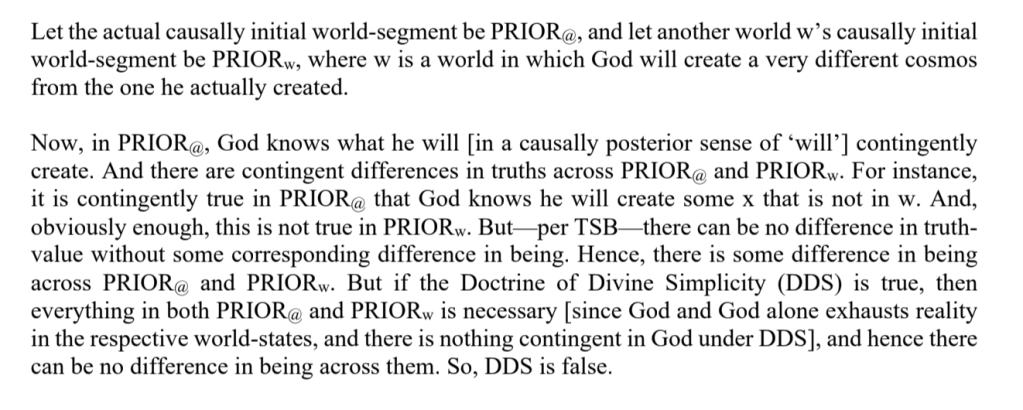I am ecstatic to announce that my article, “The fruitful death of modal collapse arguments”, has been accepted for publication in the International Journal for Philosophy of Religion. Here’s the pre-print version.

Before ending this short blog post, I wanna do two things. First, I want to direct you to the greatest [i.e., most systematic, up-to-date, cutting-edge and scholarly] resource currently in existence on modal collapse arguments against classical theism. Or, at least, it’s the greatest in my extremely unbiased opinion. 😉 This resource is my video here [“Arguments Against Classical Theism | Part 1/3”], wherein I discuss over 15 different modal collapse objections to classical theism for three hours, beginning from 1:17:06 and through 4:10:43. I criticize at least 3 of these modal collapse arguments but defend the rest.
Included in the presentation are novel modal collapse arguments developed nowhere else. To give you a taste, here’s one such argument:



TSB also provides an illuminating and powerful explanation of the difference between ontological and ideological differences between theories (cf. Koons and Pickavance (ibid)), and it also allows us to catch metaphysical cheaters (à la Merricks).
So, I take it that TSB is true. But how is this trouble for classical theism?

Again, check out the citations at the bottom of this post if you’re curious.
Author: Joe
Citations:
Pingback:Feser on Schmid on the Aristotelian proof | Majesty of Reason
Haha I’m going to download the published version via sci-hub and no one can stop me >:^D
haha! I wouldn’t stop you. But you *will* be stopped in this case, since the paper isn’t published online first yet! That will hopefully happen some time in the next 4 weeks haha 🙂
Great for you!
I’ve been exposed to your channel while watching Capturing Christianity and I am currently reading more about classical theism and your take on modal fatalism etc .. always pleased to listen to your discussions and enthusiastic way of speaking.
I am a Muslim, and I can hardly see a problem with a free personal God choosing to create a universe over another or no universe at all, simply because, as I understand the majority-Sunni school of thought, that God has certain necessary attributes that go hand in hand with His essense, such as His very existence, ultimate power, knowledge, etc .. but His “acts” are not identical to Him; God can’t be God without omnipotence, but He surely can still exist, or be God, if he chooses not to do an act such as creating anything or making revelations to prophets or whatnot. So, I do not see the connection between the problems arising from accepting the fruitful death of modal collapse arguments and Islam; is it that Islam is not a part of classical theism ? or is it that you were speaking on the lines of libertarianism, not compatibilism ? >.< can you help me understand to the best of your knowledge? Thank you and I will be thrilled to see your reply.
Great question, and thank you so much for your lovely comment! 🙂
So, I use ‘classical theism’ in a technical way — the way it’s used in the models of God debate. It is the view espoused by medieval thinkers like Maimonides, Augustine, Anselm, Boethius, Aquinas, Al Ghazzali, etc. as well as contemporary thinkers like Kate Rogers and W. Matthews Grant. If you’re curious, I explain it more in this video [ https://www.youtube.com/watch?v=-bJkTg_Z_hw ], and I also explore the modal collapse debate in depth in this video [ https://www.youtube.com/watch?v=0sBygsaG03c ]. Hope this helps! <3
Thank you for your response, and I will not try to prolong this comment thread any further, but I have seen your video in the first link and the most of the unprinted paper on modal collapse, precisely on the DDS.
When I saw the words “classical theism” I thought that Islam was by definition part of the subject matter, but soon I realized from your paper and your response to Cosmic Skeptic that the argument of modal collapse is heavily based on the DDS “including actions”; that actions of God are identical to Him. But I have never seen, in my humble experience, this notion being expressed by any Muslim/Sunni scholar or in any chapter on God’s attributes and actions. Not even Al-Ghazali. He does not equate God with His actions. Yes, attributes of God in Islam contain some of which are necessarily pertaining, identical, to God’s essence, and others that aren’t. But definitely not actions. Because, for example, the divine free action to create this universe, in its current structure, out of many other possibilities speaks out for its contingency because “it could have been any other way, or could have not be”.
Al-Ghazali disagrees with Ibn Sina stating that the existence of the actual world does not follow necessarily from God’s nature, but is rather an outcome of God’s free choice to select a particular world from all possible worlds and that connections between apparent causes and effects in the world are not necessary,
but rather a result of God’s decision to create them.
So, I just wanted to share this piece of information, and I would of course stand corrected if I see or am shown of the contrary.
and of course thanks for your efforts to make philosophy accessible to the laymen like me. I am still hesitated to invite you to an online discussion on the contingency argument and metaphysical problems related to Islamic theism, I know you are busy and I do not have a YouTube channel yet. However, the hope is still there and the invitation still stands, if you wish to engage in a small chit-chat with a Muslim theist. At least my 50+ friends who are interested in philosophy and religion could watch and learn lol 😀
P.S. there’s a possibility that only me and you could have the discussion privately on Zoom or something, if you prefer that. What matters is that we talk. I hope it doesn’t sound creepy as it might seem. But this is a humble request, and maybe this will boost up my confidence in maintaining a philosophical conversation with anybody in the future ( and in my command of the English language as it is not my first language ) 😀
Let me know here or on Facebook https://www.facebook.com/ahmed.dherar/